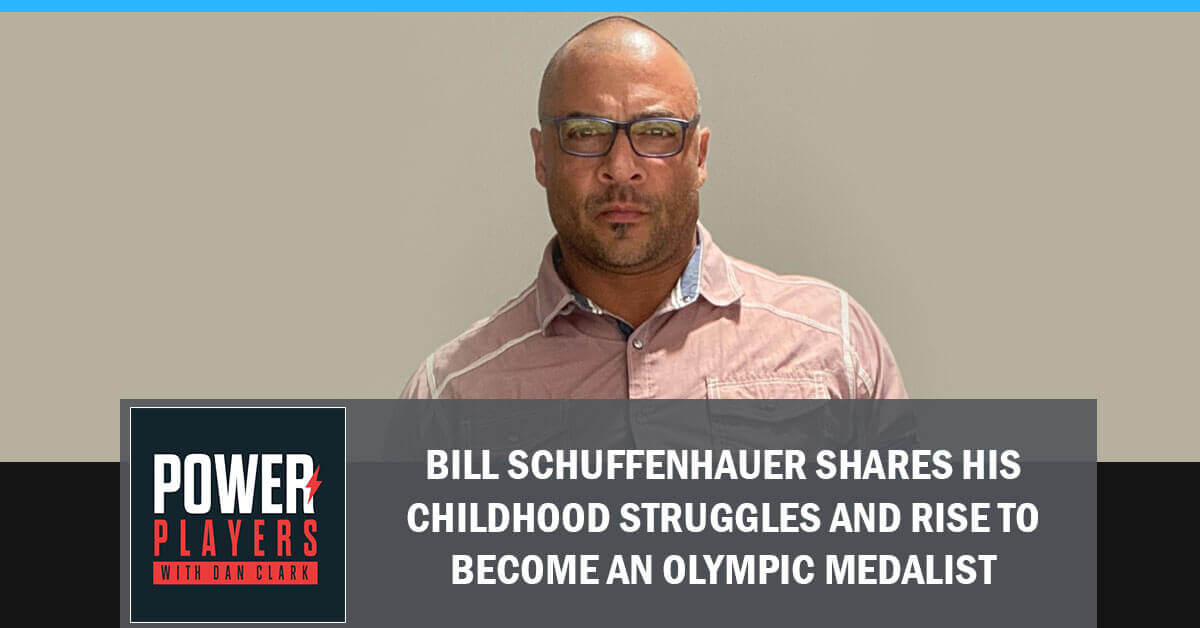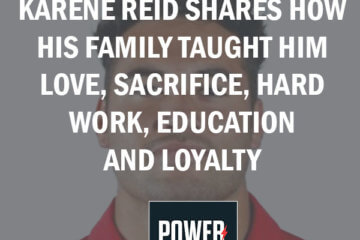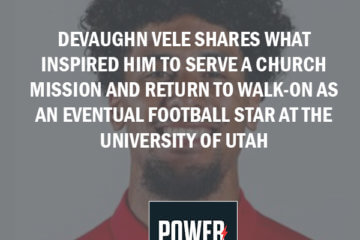Listen to the Podcast Here:

You can overcome your childhood struggles and make your dreams come true. Dan Clark sits with Bill Schuffenhauer, a four-time Olympian who won a Silver Medal in the 2002 Winter Olympic Games in the four-man bobsled competition. Bill shares his struggle to survive as a teenager. He had to live on the streets and later in a prison cell. But his stars changed forever when a coach took him under his wing. The universe throws little bones now and then, and it’s up to you to recognize them. Follow your passion and dreams, and then put the action toward them. You don’t want to miss this master class in resiliency!
—
Bill Schuffenhauer Shares His Childhood Struggles And Rise To Become An Olympic Medalist
This is an interview with four-time Olympian and silver medalist Bill Schuffenhauer. Welcome to the show. Thanks for spending some time with me. In this episode, my dear friend, mentor, and hero Bill Schuffenhauer, who was a four-time Olympian who won a silver medal in the 2002 Winter Olympic Games in the four-man bobsled competition, shares his struggle to survive as a teenager living on the streets, mom addicted to drugs and in prison when a coach took him under his wing and changed his stars forever. You don’t want to miss this masterclass in resiliency.
—
Welcome to my program.
Thank you. It is nice to talk to you. It is always an honor to engage with you with anything you have going on. It is more icing on the cake to be a part of the show.
You are a good man. Let’s get right to what people want to know. When and how did you first identify your passion as an extraordinary elite athlete?
That was something that took a lot of time, as you know, and the story goes. I grew up in one of the most underprivileged situations you can with a mom who was addicted to drugs, prostitution and sold her food stamps to get money for her drug and alcohol habit. At a young age, I was bouncing from that lifestyle of living on the streets, eating out of garbage cans, not having a place to live to over seventeen foster homes and seeing some of the most violent things that you could see on the streets here in Salt Lake City. It is what it is. I’m very fortunate that the universe throws us little bones now and then, and it is always up to us to recognize what those are.
At a young age, there was an opportunity, and I say an opportunity because, in this situation, I was getting ready to be taken away from my mom by the state again because she had gotten in trouble, went to jail, and was looking at going back to prison again. The state gave my mom some options in agreement with my grandma. They were like, “He can either go to foster care into a program for kids or he can go stay with his grandmother.” Thankfully, we decided on me moving in with my grandmother, who had moved north from Salt Lake City to a more rural area.
I recall when I walked into that room, I didn’t fit. I didn’t belong. I was a kid who no one wanted to hang out with because I was a troublemaker, big, giant, and Afro with torn-up clothes. When I walked in, I noticed a difference, and the difference was a positive energy that I noticed and something that I had never been around before, so I wanted to figure out where do I find this pot of gold, this energy, that I feel that is new to me.
The universe throws us little bones now and then, and it’s up to us to recognize them.
The first lesson is figuring out the people that you surround yourself with. I took notice of this kid who had that energy that I liked and took on to that. He looked like an all-American kid. He ran track, played football, and was part of the student body, and I wanted to know what that felt like. That was my first opportunity where I mimicked what he did on a daily basis.
He was involved with track and field, and because I was a young kid running the streets of Salt Lake City, jumping the fences, and running from cops, I felt like track and field was right up my alley, so I started there. That was the first thing that I identified with that I belonged to something. I enjoyed it and was good at it. You are probably going to take us back here, but that was my first opportunity where I was like, “This is fun.” I was naturally good at it, and I wanted to see how far I could take it.
How old were you when you met this all-American kid who helped you change your stars?
I was barely able to finish elementary in Salt Lake City and moved up to Roy. It was my first year of seventh grade in junior high school.
Readers, no matter what your past has been, you have a spotless future. You can’t always control what happens, but you can always control what happens next. Talk to us. Let’s leapfrog to high school when a coach, a different adult in your life, believed in you, and that changed everything.
When I moved up into high school, I still was not sure what I was going to do. I ran track, had a great career, and enjoyed that, but I wanted to get involved with more. It was all about changing my stars. I wanted to figure out how do I continue to build my toolbox to change my stars even though I was a high school kid that didn’t know the rules of life yet, but I knew that I wanted to make a change and change for the better.
I was fortunate to have two phenomenal coaches. One has passed now, but they approached me and said, “We would like you to do this event called The Decathlon.” As many do or do not know, that is considered one of the greatest athletic events in the world. You compete in 5 events in 1 day and 5 events the next day of track and field, and whoever has the most points at the end is the winner.
They convinced me. They were like, “You are really good at what you do. The decathlete is considered one of the best athletes in the world,” and that is what sold me. I wanted to change my stars and they believed me. I continued to build my tribe of amazing people with teachers, coaches, adopted family, and different things like that support and believe in me. To finally have somebody that believed in me in something bigger than just myself and have that support was massive.

Olympic Medalist: Figure out the people that you surround yourself with.
From that point on, we jumped in headfirst. I dedicated and committed myself to be the very best student and athlete that I could be. From day one, we excelled. As a new kid in high school, I was nationally ranked as well as state-ranked and globally ranked in the decathlon. That was the juices that I needed to continue to pursue that passion and see how far I could take it.
We are still on the first P, which is Passion. Sometimes when you fail or fall, I don’t know if we lose the passion, but we lose sight of the passion, and we need someone to help us rekindle that passion with the belief in us to get back up and go again. As you got injured, what happened to this amazing decathlon career with this promise of being an Olympian as a decathlete?
As you know, and as well as anyone else, whether it’s business, politics, military, personalized sports, whatever it is, my coach has played a huge role in helping me keep that passion alive because there were so many times throughout the years that I had an injury, or I didn’t go to a competition and ran like I was expecting to. The same thing happened.
I was training and getting ready for the 2000 Sydney Olympics in Decathlon. I ranked top five in the world. Everything was going my way. The media, family, friends, everybody you could think of on the face of the planet knew anything about my story, and even those that didn’t that found out, later on, were like, “This is your time. You are finally going to go to the Olympics and change your stars.”
I had already qualified for the Olympic trials. I possibly was favored to win an Olympic medal. I went down to a meet here locally in Utah two weeks before the Olympic trials and ended up blowing my ankle out of a long jump board bad enough to where I couldn’t walk for the next month and a half without crutches. On the day that that happened, it was devastating. All my dreams, goals, the thought of changing my stars, making history for myself, and being that kid who came from the streets to Olympic success had completely failed all in one moment’s time. I gave up on myself at that point in time, tucked my tail between my legs, and went home.
Build your tribe of amazing people who support and believe you.
As it is, the universe throws you bones every now and then, but you got to take notes and notice them no matter how small or big they are. My coach came up, and he was like, “I was talking to this one person that knows somebody else that does bobsled. What do you think about that?” I had no idea what bobsled was. I have never watched it. They said, “How cool would that be if we could create this story of a kid growing up the way you did on the streets of Salt Lake City and making it to the Olympics in Salt Lake City?” After long thoughts, conversations, and talks, I was like, “That would be an amazing story if we could write that story.” The reality is like, “What do we have to lose?”
The original goal or the foundation of what we wanted to do was to become an Olympic athlete. It didn’t matter if it was in track and field, bobsled, or badminton. The goal was to make it to the Olympics. It is the same thing when you are talking to individuals, whether it is business or anything else. What is your original foundation or vision? That is what we went with. What we decided before the Olympics in Salt Lake City is to go ahead and go forth with it, take all the passion and excitement, put it into a bobsled bucket, and pursue it 100%. That is what we did, and it worked out well.
Other guests, superstar athletes, and incredible power players have admitted what you admitted in your own way that it was not about the Olympics. Those were the only vehicles for you to challenge your passion, pursue excellence, and push yourself to your ultimate capacity and potential as a human being. That is the second P. How did you take your mental and physical preparation and take it from track and field into bobsledding? There are a lot of readers who have also never watched bobsledding. I want you to explain what you did as part of the four-man bobsled team so they can connect the dots between track and field, a strong sprinter, true athlete, and somebody who hops in a little sled and hangs on for dear life.
One of the things that I learned over the years and something that I always have to continually practice like bobsled, track and field, or whatever it is, is realizing that I don’t necessarily need to reinvent the wheel on a lot of things that I do. When we reflect on what I had done in track and field, in reality, when you look at it, I was extremely successful as a track and field athlete. I was in national championships, world rankings, and world championships. It was a plethora of accolades that would show anybody when you look at that resume as successful.
I wish this was on a visual. Readers, you need to visualize this Greek God chiseled out of black and marble. That is Bill Schuffenhauer. Therefore, if they are now thinking of you in terms of Cool Runnings, they think of you as the guy carrying the sled on your shoulders over the finish line. Let’s dispel that rumor.

Olympic Medalist: You don’t necessarily need to reinvent the wheel on many things that you do.
We realized that there was a lot of success as a track and field athlete, and it is what it is. As human beings, we have this weird ability that we take something and find ways to make it more complicated than it needs to be. Realizing that, I said, “Let’s make this as simple as possible, stick to the basics, and make this transition.” We mentally have the skillset and the strength. Physically, we have every single tool we possibly can need when it comes to it. The only thing we need to do is learn the sport of bobsled, become a student of the sport, and then apply all the tools that we have already acquired over the years into the sport of bobsled.
You were the fourth man and the pusher. What was that? Tell us what position you had in the four-man team.
The only difference that there is between all the athletes on a four-man bobsled is one guy eventually drives and one guy stops a sled, and those are very important. Outside of that, the main key is to get that bobsled from start to finish to generate as much velocity and speed without disrupting that sled all the way down the track.
The first initial part of that bobsled run where you see the four guys pushing is as critical as any other part in that race. If you don’t have a team who is one unit, can push that sled, and load and continue to create that velocity, then your race is over with. There are a lot of athletes in that bobsled sport where you will get a guy who has too much ego because he is a 100-meter running guy. He is like, “I will just run it all the way down.” You can, but what you are doing is missing out on part of that equation where you needed to create that velocity, and you are slowing it down.
We were able to figure out how to create the very best start. It was because we worked together constantly. We lived together as well as we were the first team that anyone ever saw where almost all four guys were loading the sled at the same time, but that also helped us create the fastest velocity that anybody has ever seen in the bobsled.
Make situations as simple as possible, stick to the basics, and make the transition.
When you are getting into the sled, you have to do the least amount of disruption. You are taking four guys that are anywhere from 6’0 to 6’5 averaging 220 to 230 pounds into this tiny little fiberglass sled and tell them to run as fast as they can, jump in, get in, and settle without disrupting the sled. Maybe it sounds easy, but it was one of the most difficult things I have ever had to learn how to do. On top of that, when you are going down, you have to know the track by heart without looking at it. When you hear somebody say, “I know that at the back of my hand,” it is like that more because you have to know where the pressures are, when you are turning left or right, and be in a perfect position.
To talk more about that, we would sit in a wind tunnel for hours upon hours at the University of Maryland to make sure that we had the very best sitting position in the world. Once you start factoring in all of these things, that is when you get to a level of world-class or Olympic class. Bringing out altogether on one single day at one single time for four runs is the key to success in that, like in any other sport, organization, work, or personal life. It was years and years of consistent practice.
We have all been raised to not sweat the small stuff but it is the small stuff that makes the difference. It is the difference between 1/100th of a second or 1/10th of a second. What was the difference between the gold medal run and your silver medal run in time?
To help everybody understand the picture, at the Olympics, the bobsled is run over two days and each day, you get two runs. Every team in the competition gets two runs in one day and two runs the second day on a track that is about 1 mile long and you are averaging about 88 to 89 miles per hour on a track in Salt Lake City. In the end, the difference between gold and silver was 1,500s of a second. The difference between silver and bronze was 900s of a second. If you take and run that car down the road at 90 miles per hour and factor in what that is distance-wise, it is almost less than a foot difference from gold, silver, and bronze of reaching that finish line.
For the record, anyone who visits the Olympic Village in the Park City area has an opportunity to pay some money and take a bobsled ride. I did that and I completely advise against it. It felt like I have 90 miles an hour enema and I got my space to fit back where it was supposed to be. My level of respect for you and your co-athletes is so high. You said something intriguing that we need to address as we are winding down our time together. You said taking these four superstar giants and fit athletes running, sprinting, getting the velocity up as quickly as you can, and hopping in this miniature sled was one of the toughest things that you could imagine.

Olympic Medalist: Follow your passion and dreams, and then put the action toward them.
I know a little bit more about your story. You have this dream to be an Olympian. You shifted gears and went from the Summer Olympics to the Winter Olympics. Someone on your team in influence said, “Let’s take you to the bobsled team.” I can imagine these bobsledders looking at you like, “Why do you think you can rain on my parade? Who do you think you are?” What kept you pursuing the last P? What kept you pursuing this passion through all of this preparation that you have gone through, overcoming the negativity and lack of support that you originally had, and only being named to the team at the very end? Please consolidate that experience.
I wish we did have some video on this because you are hitting the nail on the head for more of an emotional piece for me, and that stemmed from growing up the way I did. I was never looked at as someone who would ever accomplish anything. Even family members of mine were telling me I was never going to achieve anything or if I was even going to make it even to the age of sixteen alive. When I decided to change my life and take some accountability for myself to make something out of myself, I knew that I was going to not let anything get in my way. I was going to go and do it how I could with the very best I could.
With that in realization, I knew that I had to fight and dig deeper than anyone else. No one was going to do it for me except me. I had visioned from the time I was a seventh-grader originally having that goal of doing something and then when I got into high school, having that dream of being an Olympian, seeing myself standing on the podium and raising my hand in the air knowing that I accomplished something that was, for the most part, impossible. Those were the things that helped me pursue that passion and not let anything get in my way.
It all came from a massive tribe of people. This is one of the things I learned from you. You have that saying that you become the sum of the seven people that you spend the most time with. I realized that, and I had to surround myself with the most amazing people that were not just athletes but coaches, family members, and friends to help support that dream. I realized that I could not do it by myself.
Fight and dig deeper than anyone else.
I knew what the dream was, what I wanted to do, and I was going to accomplish it. When you have that much passion for something, nothing can get in your way. You can accomplish everything and anything you want if you have that passion and surround yourself with those people. I was not going to let anything stop me. When I had an opportunity to stand at the Olympics here in 2002, the most important part of that was not getting the Olympic medal. It was the time I had to reflect on the journey that got me there and the people that I surrounded myself with.
What a great way to wind down. You are on the hot seat. This is the question I ask everybody. Professor Randy Pausch was famous for conjuring up and coining the speech titled Last Lecture. If you had one day to live, what is your one consolidated message to the world?
My one consolidated message to the world would be one of my quotes, “Dreams are only dreams until we take the actions to ignite them.”
Repeat that one more time, and then give us a way to join your tribe or find out what you are doing so we can be inspired by you for the rest of forever.
Dreams are only dreams until we take the actions to ignite them, and that comes from my journey and the fact that we have got 7.5 billion people on the face of the planet that failed to take action to achieve their dreams. Follow your passion and your dreams, and then put the actions towards them. I would love to connect with anybody who would love to connect. The easiest way to reach me is via the website, which is OlympianSpeaks.com. I’m also all over Facebook and Twitter.
I appreciate you, and as I close out every show, remember, ladies and gentlemen, that when you finally decide to be a power player, your power play begins in you like my dear friend and her, Bill Schuffenhauer said and explained. Until next time, quantify your takeaway and make a power play. Thanks, Bill, and you all have a great day.
Important Links:
- Bill Schuffenhauer
- Facebook – Bill Schuffenhauer
- Twitter – Bill Schuffenhauer
About Bill Schuffenhauer
 Bill Schuffenhauer is an American bobsledder who has competed since 2000. Competing in three Winter Olympics, he won the silver medal in the four-man event at Salt Lake City in 2002.
Bill Schuffenhauer is an American bobsledder who has competed since 2000. Competing in three Winter Olympics, he won the silver medal in the four-man event at Salt Lake City in 2002.


